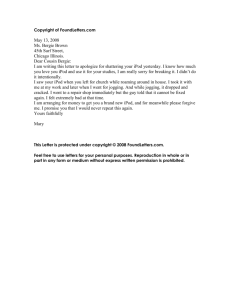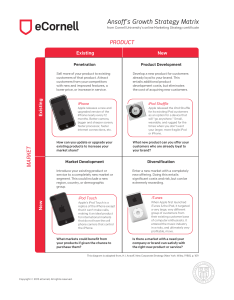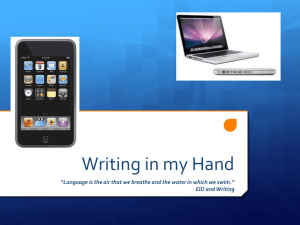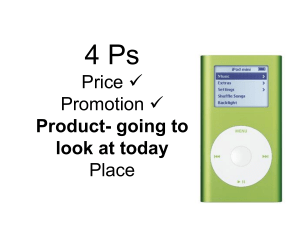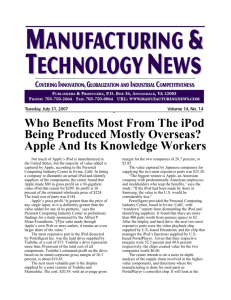consumerarticle - University of San Diego Home Pages
advertisement
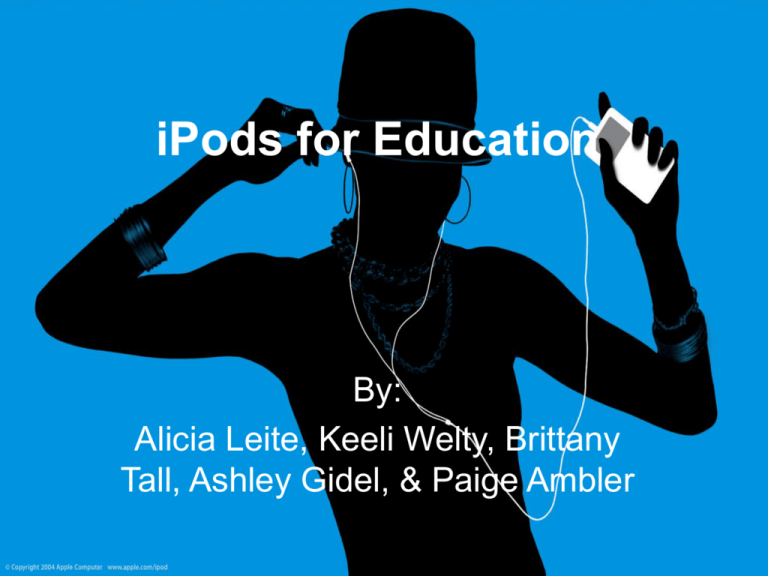
iPods for Education By: Alicia Leite, Keeli Welty, Brittany Tall, Ashley Gidel, & Paige Ambler Overview of Article • Duke University distributed 1,650 iPods to their freshmen to be used for educational purposes • They have set up a Web site on iTunes music site that will allow students to download recorded lectures, audio books, language lessons and other course content • “We’re approaching this as an experiment, one we hope will motivate our faculty and students to think creatively about using digital audio content … to advance educational goals…” – Tracy Futhey, vice president for information technology at Duke Apple’s History • Prior to 1998, Apple struggled with rising competition & lacked innovative products • 2000 was a rocky year for Apple due to slower sales & misunderstanding of consumer market • 2001 was a pivotal year for Apple- with major updates to the iBook line in May followed by the introduction of the iPod in October • 2003 – Apple unveiled the iTunes Music Store & later that same year they released the userfriendly Windows verson • 2004 – introduced the iPod mini Apple’s Latest Products & Services • • • • iBook “most anxiously awaited Apple computer” New semi-revolutionary features helping to change Apple’s position in the market iPod mini Height & width of business card (various colors) Raised the bar for portability in a hard disk music player • • • • • iPod “Apple’s first strike into the digital music market” iPod represented the perfect compromise between size and storage capacity Has impressive industrial design iTunes Offers legal online music download services Has 70% of market share iPod’s Success • Continued success with the iPod is drawing new customers to the Macintosh fold- “halo effect” • “If only a small number of those users bought Macs, sales could surge” • It’s predicted that Windows users could have 100 million iPods in hand by 2008 • As of January 2005, Apple reported quarter revenue profits to be higher than ever seen by company • iPod sales led the way with 4.58 million units sold, a 525% increase from the same quarter a year ago • The iPod product segment contributed $1.211 billion in revenue How Apple Markets the iPod •Television Commercials •Have you seen an ipod commercial lately? •Word of Mouth •How many of your friends have an ipod? •Magazines •Wired, MacWorld, and Spy Mag •Billboards •Located in high traffic areas in large cities Word of Mouth! • Brand Loyalty • Individuals who have always used Apple Computers are more open to using the Apple iPod • Observational Learning • Individuals observe others using the iPod and want to imitate that • Accessibility to Information • Through internet, Apple store, Friends and Family Have you seen these Commercials? • New Technology – SHUFFLE • Marketing with Pepsi – Pepsi 1 • Celebrity Marketing – Pepsi 2 ~celebrity • Marketing with BMW – BMW The iPod at Duke – Current Market Domination (18-24 year olds) College aged students – Who have they previously targeted? – Who makes up their new segment? “We think the power and flexibility of these devices offer some real advantages over other media used to distribute educational content such as CD-ROM’s and DVD’s.” Duke Students as Opinion Leaders -Status symbol of Duke University -Knowledge taken more seriously by others -Socially active and highly interconnected in their communities -“Effective opinion leaders tend to be slightly higher in terms of status and educational attainment than those they influence, but not so high as to be in a different social class.” -Duke students are Homophilious Duke Students are Market Mavens • Information transmitters • Perfect group that can spread iPod popularity • Have solid general product knowledge • General high perception of Duke students Market Expansion • Effect on Professors Mere Exposure: Tendency to like things more that we are in contact with frequently • Positive Word of Mouth Professors FamiliesFriends Entertainment to Education • At Duke, About 75% of Freshmen surveyed used their iPod for academic work. • Most popular student uses: –Recording lectures –Taking oral notes –Electronic flash cards • iPod audio capabilities used in presentations • Increased accuracy in quoting from interviews • Facilitates learning –The iPod has made course material “more convenient” –Students more engaged in classes when allowed to use the iPod • Language classes –master pronunciation –recorder diaries • Music classes –interaction with the music • Foreign students –replay capabilities Why the iPod? • • • • • • • Size Storage Capacity Highly mobile Versatile “Glorified tape recorder” Familiarity Broad appeal Possible Problems – Privacy Rights, Copyright infringements • However, these could be a problem regardless of the iPod – Students may start skipping classes – Students may not buy text books Competition In education: • CD-ROMs and DVDs from text books • Use of websites to download lectures directly to computers In the technology industry: • Dell • Samsung • Sony • Olympus • Rio • RCA Wrapping it Up! • The experiment has been successful • There is much opportunity for future growth – Expansion to other school – Increased capabilities of the iPod • Competition will soon catch on to the new idea The Possibilities Are Endless “ The value of the gadgets goes beyond the classroom. Obviously if you learn that there are creative ways to do things that you hadn’t thought of before, and…that new technologies may provide opportunities you hadn’t thought of, that’s part of learning too.” - Peter Lange, Duke’s provost Discussion Questions What do you think about iPods being used to download lectures and books for students? Would you use this if it were available at USD? Do you think giving iPods to all students is the most efficient way to use funds?
